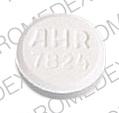Generic Robinul Availability
Last updated on Apr 10, 2025.
See also: Generic Robinul Forte
Robinul is a brand name of glycopyrrolate, approved by the FDA in the following formulation(s):
ROBINUL (glycopyrrolate - injectable;injection)
-
Manufacturer: HIKMA
Approved Prior to Jan 1, 1982
Strength(s): 0.2MG/ML (discontinued) [RLD] -
Manufacturer: ROBINS AH
Approved Prior to Jan 1, 1982
Strength(s): 0.2MG/ML (discontinued)
ROBINUL (glycopyrrolate - tablet;oral)
Is there a generic version of Robinul available?
Yes. The following products are equivalent to Robinul:
glycopyrrolate tablet;oral
-
Manufacturer: ADAPTIS
Approval date: February 3, 2014
Strength(s): 1MG [AA] -
Manufacturer: ALEMBIC
Approval date: November 30, 2018
Strength(s): 1MG [AA] -
Manufacturer: APPCO
Approval date: January 3, 2017
Strength(s): 1MG [AA] -
Manufacturer: AUROBINDO PHARMA
Approval date: April 15, 2013
Strength(s): 1MG [AA] -
Manufacturer: CHARTWELL RX
Approval date: March 21, 2008
Strength(s): 1MG [AA] -
Manufacturer: ENDO OPERATIONS
Approval date: August 31, 2006
Strength(s): 1MG [AA] -
Manufacturer: NATCO
Approval date: June 20, 2016
Strength(s): 1MG [AA] -
Manufacturer: OXFORD PHARMS
Approval date: October 19, 2011
Strength(s): 1MG [AA] -
Manufacturer: QUAGEN
Approval date: July 10, 2024
Strength(s): 1MG [AA] -
Manufacturer: RISING
Approval date: December 29, 2008
Strength(s): 1MG [AA] -
Manufacturer: SUN PHARM INDS LTD
Approval date: August 18, 2009
Strength(s): 1MG [AA] -
Manufacturer: VELZEN PHARMA PVT
Approval date: September 21, 2012
Strength(s): 1MG [AA]
Note: No generic formulation of the following product is available.
- glycopyrrolate - injectable;injection
Note: Fraudulent online pharmacies may attempt to sell an illegal generic version of Robinul. These medications may be counterfeit and potentially unsafe. If you purchase medications online, be sure you are buying from a reputable and valid online pharmacy. Ask your health care provider for advice if you are unsure about the online purchase of any medication.
See also: Generic Drug FAQ.
More about Robinul (glycopyrrolate)
- Check interactions
- Compare alternatives
- Drug images
- Side effects
- Dosage information
- During pregnancy
- Drug class: anticholinergics/antispasmodics
- Breastfeeding
Patient resources
Other brands
Lonhala Magnair, Seebri Neohaler, Cuvposa, Dartisla ODT, ... +2 more
Professional resources
Other brands
Lonhala Magnair, Seebri Neohaler, Cuvposa, Dartisla ODT, Glyrx-PF
Related treatment guides
Glossary
| Term | Definition |
|---|---|
| Drug Patent | A drug patent is assigned by the U.S. Patent and Trademark Office and assigns exclusive legal right to the patent holder to protect the proprietary chemical formulation. The patent assigns exclusive legal right to the inventor or patent holder, and may include entities such as the drug brand name, trademark, product dosage form, ingredient formulation, or manufacturing process A patent usually expires 20 years from the date of filing, but can be variable based on many factors, including development of new formulations of the original chemical, and patent infringement litigation. |
| Drug Exclusivity | Exclusivity is the sole marketing rights granted by the FDA to a manufacturer upon the approval of a drug and may run simultaneously with a patent. Exclusivity periods can run from 180 days to seven years depending upon the circumstance of the exclusivity grant. |
| RLD | A Reference Listed Drug (RLD) is an approved drug product to which new generic versions are compared to show that they are bioequivalent. A drug company seeking approval to market a generic equivalent must refer to the Reference Listed Drug in its Abbreviated New Drug Application (ANDA). By designating a single reference listed drug as the standard to which all generic versions must be shown to be bioequivalent, FDA hopes to avoid possible significant variations among generic drugs and their brand name counterpart. |
| AA | Products in conventional dosage forms not presenting bioequivalence problems. Products coded as AA contain active ingredients and dosage forms that are not regarded as presenting either actual or potential bioequivalence problems or drug quality or standards issues. However, all oral dosage forms must, nonetheless, meet an appropriate in vitro bioequivalence standard that is acceptable to the Agency in order to be approved. |
Further information
Always consult your healthcare provider to ensure the information displayed on this page applies to your personal circumstances.

